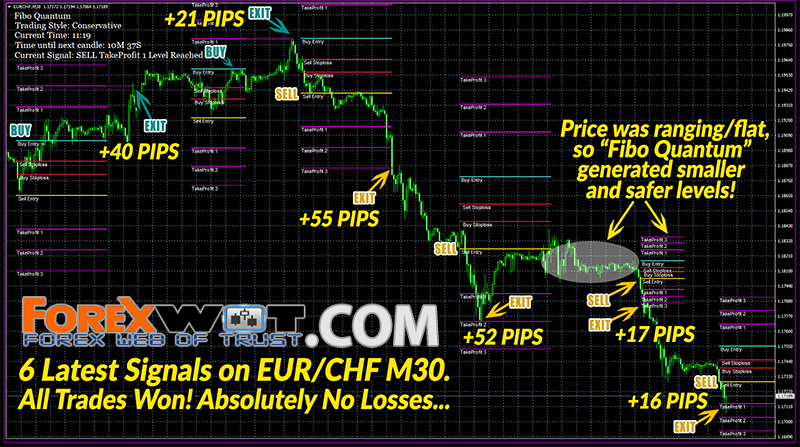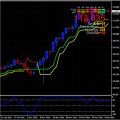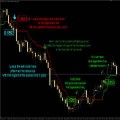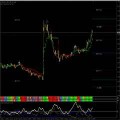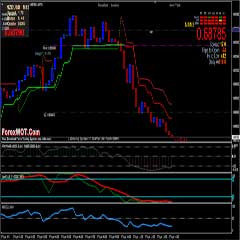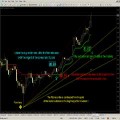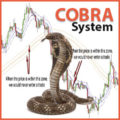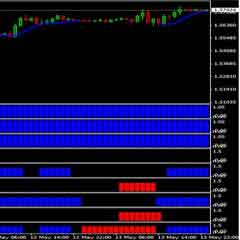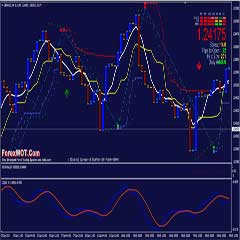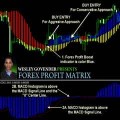Forex Trendsetter™ Trading Strategy is almost totally automatic, so there are still a few small decisions to be made by the trader when using the system. But, I promise, the part you play in trading Forex Trendsetter™ will be minimal.
I’m going to go through the indicator that is on the bottom of the chart – this is the SuperTrend™ indicator.
The SuperTrend™ indicator keeps us on the right site of the market. Forex Trendsetter™ does not pick tops or bottoms – we only trade with the trend to take high-probability, low-risk trades.
- When the bars are RED on the SuperTrend™ indicator – we will only be taking short trades (that is, we will only be looking to SELL).
- When the bars are GREEN on the SuperTrend™ indicator – we will only be taking long trades (that is, we will only be looking to BUY).
Take a look at this chart:

That’s all there is to the SuperTrend™ indicator. The indicator above SuperTrend™ is the SuperTrigger™ this is where the magic happens.
For a trade to take place, we first look at the SuperTrend™, to see whether we are looking to BUY or SELL.
Once we know which direction we are going to be trading… we then look to the SuperTrigger™.
We’ll start with a simple Long trade…
Let’s say that the SuperTrend™ is green:

This means that we will be looking for LONG trades only.
So now that we have our trade direction we wait for a signal to enter using the SuperTrigger™.
As you will see there are a few types of SuperTrigger™ signals that we trade.
The ideal one for us, when the SuperTrend™ is green, is to get three red bars in a row and then a one green bar… this is a definite BUY signal for us. This SuperTrend™ and SuperTrigger™ formation would look like this:

So, continuing with our example, we get exactly this signal on the SuperTrigger™:

Once we get our 3R+1G (this means 3 Red bars then 1 Green Bar) signal on the SuperTrigger™ we then enter the market on the open of the next bar:

Our stoploss would typically (but not always… more on this later) go behind the lowest bar of the 3R+1G signal – so in our example this would be the low of the price bar that occurred on the third SuperTrigger™ bar:

This is how this particular trade works out:

I’m going to go into exit strategies later; but for now I want to focus on the entries and make sure you understand them completely.
Let’s now look at a simple Short trade…
This is exactly the same as the 3R+1G Long trade – but it is inverted; instead of our signal being 3 red bars and then one green bar on the SuperTrigger™ – it is 3 green bars and then one red bar.
And, as you can probably work out, the SuperTrend™ MUST be red to tell us that we are only looking for short trades.
So we wait for the SuperTrend™ to tell us to take short trades only:

We then look-up for our 3G+1R signal on the SuperTrigger™:

We then enter on the open of the next bar and place the stoploss above the highest bar in the 3G+1R signal:

The market does not fall a huge amount in this example – but that’s the way trading is. Sometimes you’ll get a small gain; sometimes you’ll get a big gain; and sometimes you’ll get a small loss; BUT we’ll never get a big loss!
Our stoploss are small every time. Small stoplosses are fundamental to this system – it is part of what makes it so effective.
Okay, we’ve now covered the 3R+1G for the Long trade… and we’ve also covered the 3G+1R for Short trades…
These particular signals on the SuperTrigger™ do not occur as often as we’d like. However, as you’ve probably noticed by now, there are yellow bars on the SuperTrigger™.
I’ll now explain those…
The yellow bars on the SuperTrigger™ are what we call Hold™ bars.
Hold™ bars give us more flexibility in the two main signals we get (that’s the 3R+1G and 3G+1R signals).
The Hold™ bars are like a “pause” button for our SuperTrigger™ signals. So, instead of requiring that say, for example,
- we have 3 Red bars and then 1 Green bar in a row (which would total four bars) for a Long signal;
- we could instead have 2 Red bars, 1 Yellow Bar, 1 Red bar and then 1 Green bar. That signal would look like this:

So you can see, if the yellow bar was not there, we would have a simple 3R+1G signal on the SuperTrigger™.
We allow any combination of Hold™ bars in the SuperTrigger™ signal. The following examples are all valid SuperTrigger™ Long signals:




In all the above examples we can see that, if we remove the yellow bars, the SuperTrigger™ signals would be standard 3R+1G signals.
I won’t go through the SuperTrigger™ Short signals when there are Hold™ bars – but I’m sure you understand that it is exactly the same as the Long signals – but 3G+1R instead of 3R+1G for the Long SuperTrigger™ signal.
Quite often you will get many Hold™ bars occurring while you are waiting for a signal on the SuperTrigger™.
When this happens it is best NOT to take a trade. The SuperTrigger™ is telling you that the market conditions are “choppy” and that it is advised to stay out for the time being.
Here is an example of what I mean:

We can see in the above example that we are kept out of the “choppy” market by the SuperTrigger™ giving us lots of Hold™ bars. We stay out!
Note: you will miss some good trades by not entering when you see too many Hold™ bars… but you will be kept out of a lot more bad trades by doing this!
I’m now going to go through some trades so that you really get a grip of how to trade Forex Trendsetter™. I won’t spend much time explaining them – I’ll just give you the charts; interpreting the SuperTrend™ and SuperTrigger™ indicators to take a trade, as you have seen, is very simple.
This first trade is a basic London session Open trade.
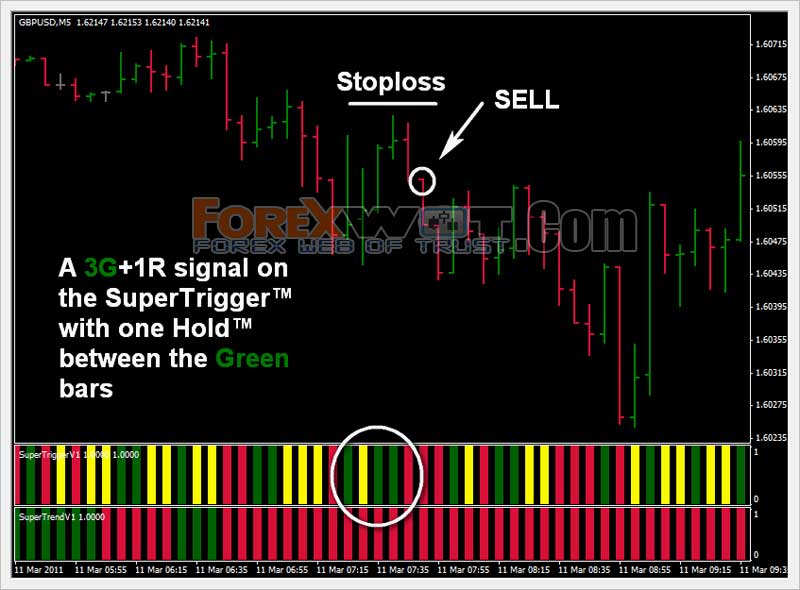
This second trade comes along later in the same London morning session.

The trade above demonstrates perfectly why the system needs your little bit of discretion and experience to trade it; it’s not the type of trade I would advise taking in your first few day – but your confidence will grow with these types of trades very quickly!
Remember what I said about the London morning session? This is a perfect example; this second trade really moved far.
Two hours after the second trade we get another signal.
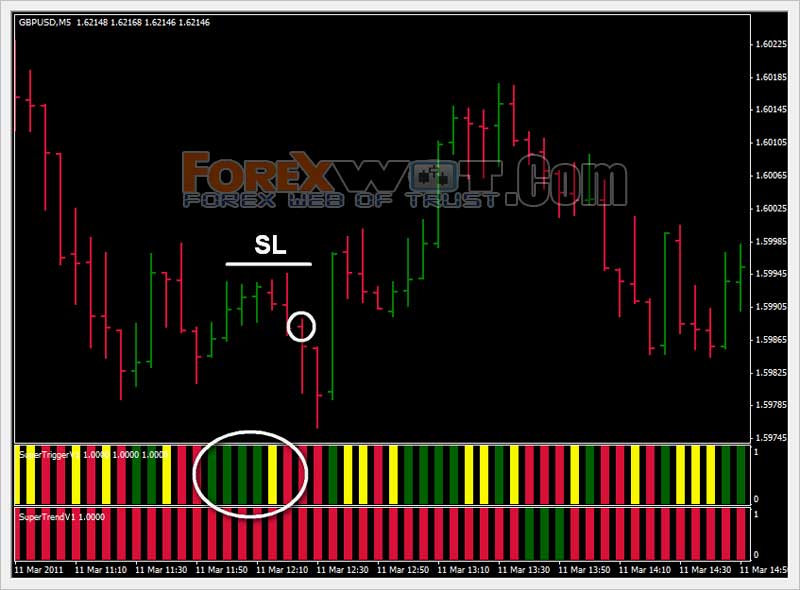
Okay, so that trade never worked out, that’s the way of trading.
However, in this example, there is a good chance we may never have taken that trade.
Why? Well, the observant of you may already know, it’s the range that the pair has made already.
The pair is GBP/USD and the recent average range of a trading day for the pair is 120 pips. Now, before this signal we just got, it had already moved almost 100 pips.

So you can see in this example how keeping a note of how much of a move a pair has already made can help you leave potentially poor trades.

